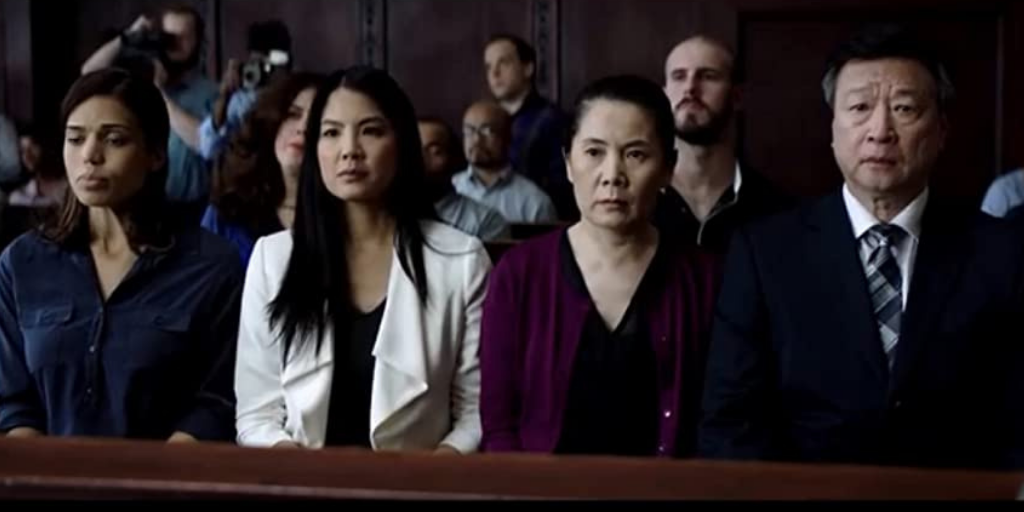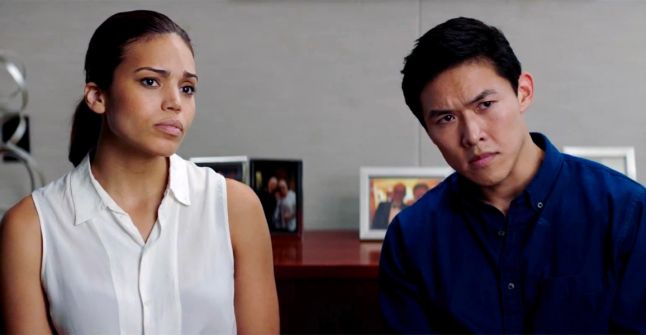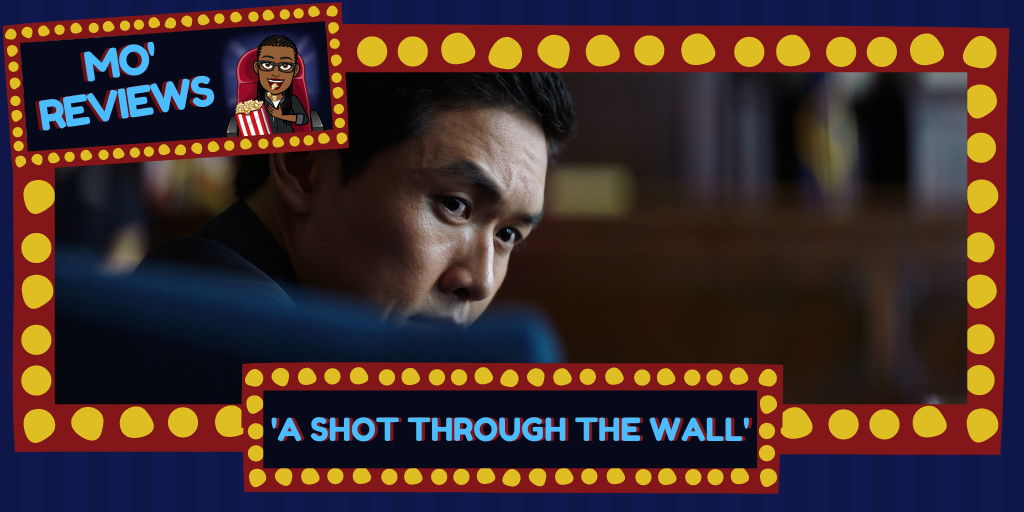Written and directed by: Aimee Long
Starring: Kenny Leu, Ciara Renée, Fiona Fu, Tzi Ma, Lynn Chen, Clifton Davis
Synopsis (IMDb): A Chinese-American police officer’s life unravels after he accidentally shoots an innocent Black man. Facing trial, he wades through his guilt as he navigates the complicated worlds of media, justice, racial politics and his own morality.
Monique’s review:
Even though A Shot Through the Wall came out on the indie circuit in 2020, its message has only grown in more importance. Not only did it become poignant during the racial and social uprising that happened in 2020 regarding the deaths of Black men and women back-to-back, but it’s gained new resonance in the wake of Asian-American deaths–deaths that are also at the hands of racist Americans.
Loosely based on the real-life case of police officer Peter Liang who was tried and convicted of the murder of Akai Gurley in 2014, A Shot Through the Wall follows Mike Tan (Leu), a New York police officer who seems to have everything going for him; a beautiful fiancee named Candace (Renée), a supportive father-in-law (and Mike’s police chief) D.C. Walker (Davis), and a loving family including mom May (Fu), dad Chow (Ma) and sister Grace (Chen). When he and his partner Ryan (Derek Goh) are chasing a possible suspect through an apartment complex, Mike’s gun accidentally misfires into a wall, killing a Black man in his home, in front of his mother, no less.
One of the phases that continually comes to my mind when reviewing certain films is the title of author Chinua Achebe’s book, Things Fall Apart. Indeed, things proceed to fall apart as Mike reckons with his actions while trying to subvert blame by insisting that his manslaughter was accidental. But as he comes to terms with where his life is headed, he’s faced with a choice–accept responsibility and face the consequences, or continue to disregard how his own buried biases, reinforced by his police training and his belief that being engaged to a Black woman erases prejudice, might have played a part in him drawing his gun in the first place.

Long does a great job of balancing several points of view into an entertaining, engaging, provocative, and thought-provoking story. Some of the provocativeness for me came from the fact that it was actually entertaining instead of just presenting a message. What I mean is that I ended up finding some similarities between some moments in my life and how Mike’s family acted or reacted to situations. As I told Leu in a recent interview, May’s overprotectiveness, to the point of barging in on important conversations, reminded me of my own mom’s incessant but purely loving need to keep a watchful eye over everything. And of course, Mike’s situation is something I hopefully never have to experience, but his petulant chip on his shoulder about responsibility isn’t unrelatable to me, since I think we all can relate to having some level of petulance about accepting responsibility for all parts of our lives, particularly the parts we don’t want to own.
I think the fact that we can relate to Mike and that we can humanize him in our minds makes us reconsider the person who’s behind the trigger. Perhaps because Mike is a racial minority and not another white cop makes it easier for us to humanize him. Often, non-white cops are either objectified by their own police departments or denigrated by their fellow officers and the public alike. Even Candace spoke about how her dad was often trotted out by the department when they needed a Black face to comment on a Black-centered crime. Mike, on the other hand, is in the wedge position many Asian-Americans find themselves in; “acceptable” enough to make it further in white society, but thrown to the wolves by white society once a minority face is needed as a scapegoat. Indeed, Grace is already hip to the fact that Mike’s compatriots have scapegoated him over his white partner, who seemingly didn’t have to face trial despite being an accomplice to the case. She also says something that’s as illuminating as it is damning–she keeps forgetting that she’s not like “them” until a white person reminds her what they truly think of Asians in America.
It’s lines like this, as well as moments like Mike struggling with owning his own biases in a therapy session, for instance, that shows the film is willing to be self-reflective. In this way, the film wants to also take responsibility for biases and prejudices that are latent in both Asian and Black communities. And with the cast’s amazing performances providing layered looks at characters placed into uncomfortable situations, the film dares to look at the messiness that comes with a racially and socially-fraught society.
The film is primarily from an Asian-American perspective and gives viewers a look at how race is viewed from a perspective not often seen in the media. Being caught in the middle between whiteness and Blackness presents some interesting and hard-to-resolve situations that aren’t usually addressed in film and television. With that said, I think the story could be served even better if there were at least one or two more scenes showing how Mike’s manslaughter charge affected Candace and her father.

To be fair, we do get scenes with Candace talking about what it’s been like for her and her father to face racism in their lives, and a pivotal moment in the film pushes Candace to her limit. But it would have been cool to see a scene with either Candace or her father by themselves at their prospective jobs or waiting for the train, hearing others gossip about them, or see online comments directed at them. Candace herself says in a scene that she has to deal with people wondering if she’s a traitor of sorts for being with someone who shot a Black man in cold blood. It would have been nice to see her have a scene alone where she’s processing her swirling feelings.
Overall, A Shot Through the Wall provides a great dramatized look at the issues of racial politics, particularly anti-Blackness and a need for police reform. The film might have been based on Liang, who was somehow allowed not to serve any jail time despite being convicted. But the film does an excellent job of taking the conversation further to examine how everyone needs to take a look at their own latent biases. Thanks to the times we live in now, the film also shows in a heartwrenching way how white supremacy affects minorities in largely the same way across the board. If you’re seen as threatening, it doesn’t matter what societal cache you hold. And ultimately, this persistent question of how to uproot racist actions is what society itself needs to take responsibility for.
A Shot Through the Wall is now in theaters and on VOD.
Additional recommended viewing: Down a Dark Stairwell, a documentary chronicling the racial and social upheaval surrounding the Peter Liang case.
